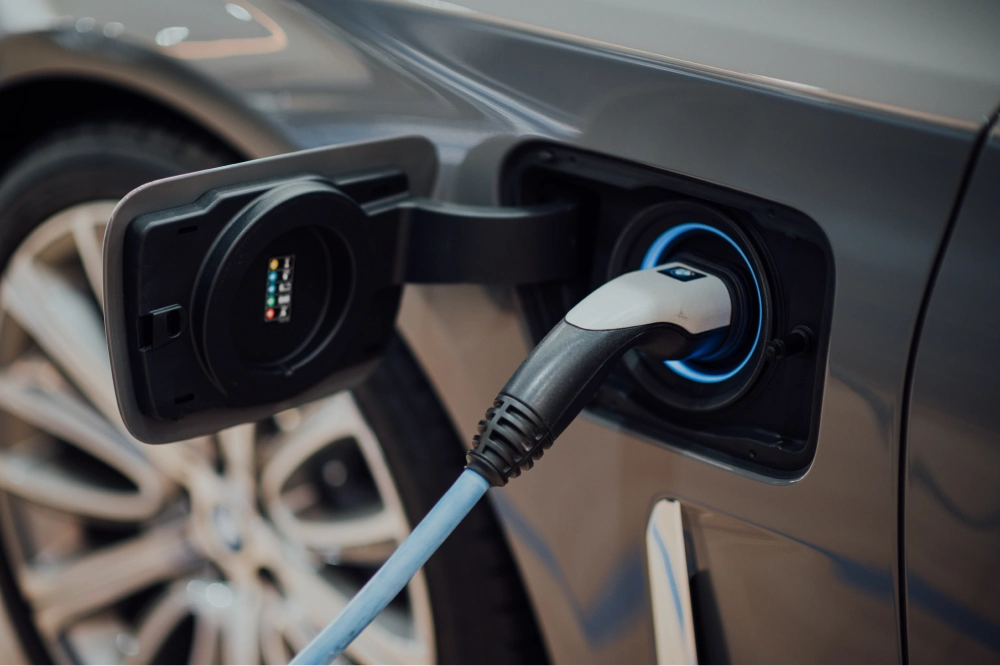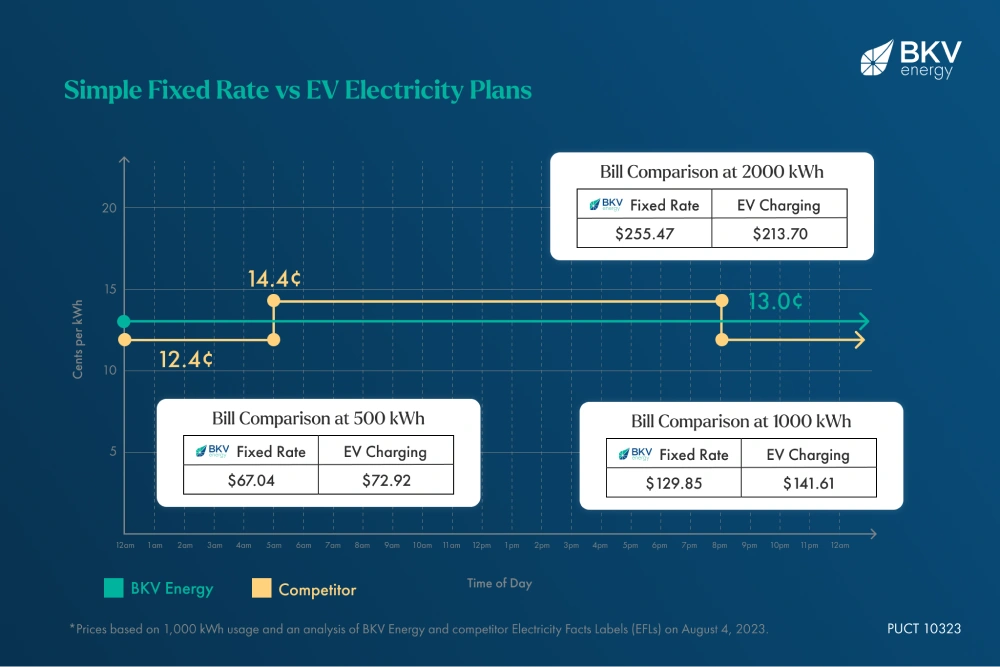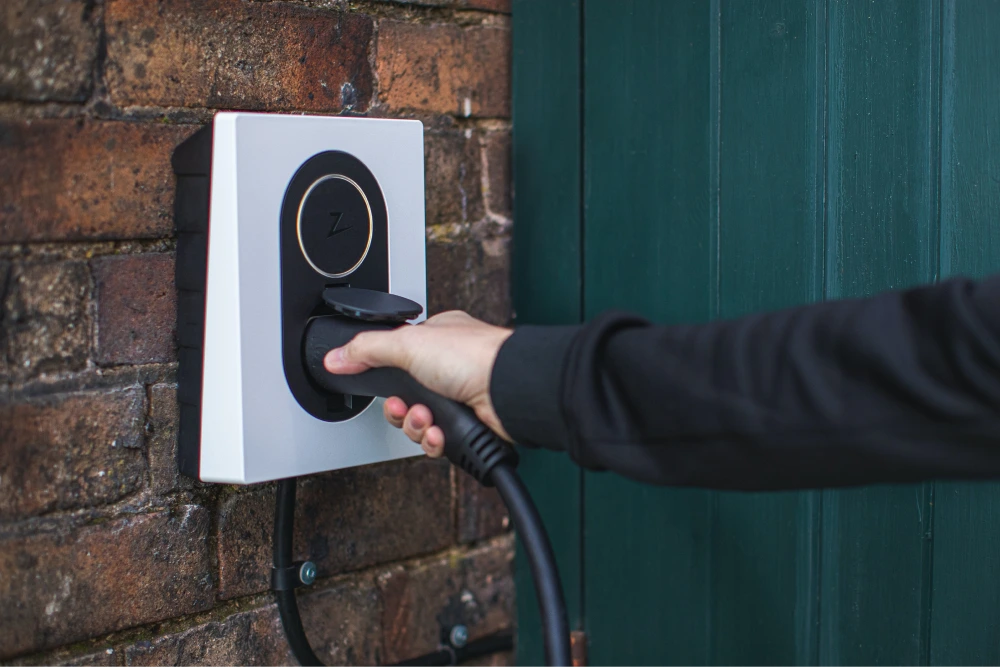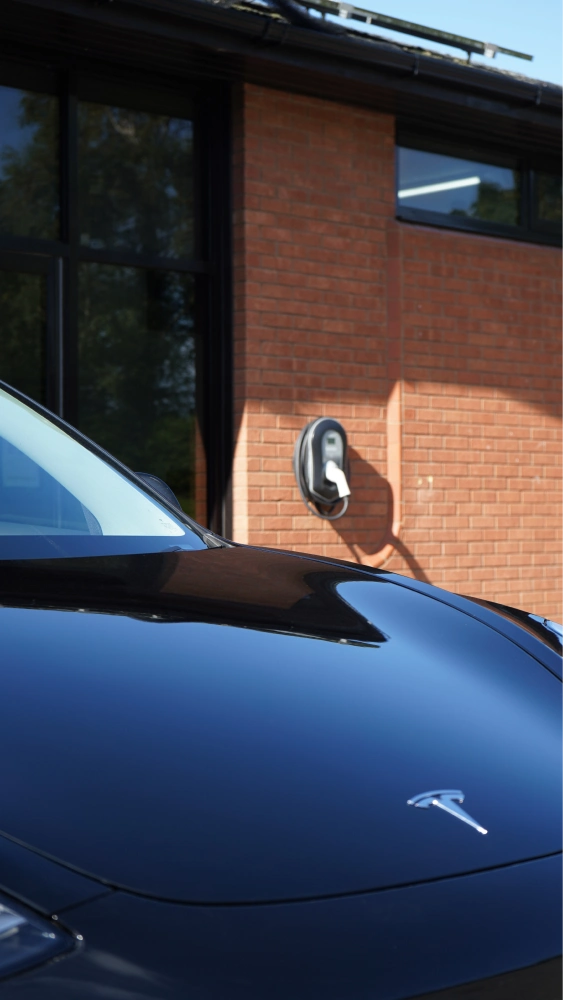Pros and Cons of Free Nights and Weekends Electricity Plans
3 minute readAre Free Nights and Weekends worth it? In this article we examine a couple of the most popular energy plans
Home > Learning Center > How the Energy Industry Works > Should You Enroll in an EV Charging Electricity Plan?
6 minute read • Last update February 2024

For most drivers of electric vehicles, we do not recommend enrolling in an EV charging energy plan. Your monthly energy bills would likely be lower with a simple fixed rate plan that does not have time of use stipulations in the terms and conditions.
As electric vehicles (EVs) become increasingly popular, many potential and existing EV owners are left wondering about the best way to charge their vehicles at a low cost. Electric vehicle charging plans have been introduced as a solution to this problem, but are they worth it?

An Electric vehicle (EV) charging electricity plan is designed to provide EV owners with special rates that cater to their unique energy usage patterns. These plans come in various types, such as Time-of-Use (TOU) plans and dedicated EV plans, tailoring to the diverse needs of EV owners.
Time-of-Use (TOU) plans are designed to incentivize a shift in energy usage throughout the day, in order to reduce the load on the grid and promote sustainability. These plans offer lower energy rates during off-peak hours when the demand for electricity is low, and higher rates during peak hours when the demand is high, encouraging customers to use electricity when it’s more affordable and environmentally friendly.
Examples of other Time-of-Use plans include those that offer free nights or free weekends.
Dedicated EV Plans, on the other hand, offer reduced rates specifically for EV charging during designated hours. These plans recognize the unique charging needs of electric vehicle owners and provide them with a tailored solution to manage their energy costs. For example, the EV Plan offered by DTE Energy provides customers with reduced energy rates for EV charging during designated hours.
Enrolling in a dedicated EV plan can offer benefits such as potential lower monthly bills and a positive environmental impact through the promotion of electric vehicle use. Yet, considering your specific EV charging needs and comparing the available plans is a vital step before committing to a decision.
EV charging plans are a niche marketing tool to encourage drivers of electric vehicles to enroll in a plan that is likely to lead to higher energy bills than a regular fixed rate plan. The idea is to entice drivers with potential savings by leveraging off-peak charging times.
It’s crucial to realize that EV charging plans are designed with higher kWh rates (between 5-10 cents more per kWh) during the day that may counterbalance free hours over night. Even with the free hours, you end up with a higher bill.
To help you ascertain whether an EV charging energy plan suits your needs, ensure to peruse the Electricity Facts Label to comprehend the plan’s details, including the price per kWh, contract terms, and other pertinent information. Furthermore, ponder over alternative options such as fixed rate electricity plans.

Higher kWh rates during peak hours can overcompensate for lower rates overnight, leading to higher overall energy costs for consumers who use electricity primarily during the day.
Some EV charging plans charge an additional 5-10 cents per kWh, which can significantly increase your overall electricity costs, even with the free hours for charging the vehicle over night.
The majority of electricity consumption for residential customers occurs during the day, largely attributed to people using their air conditioners and other appliances when they are at home. As a result, higher kWh rates during the day can significantly impact your overall energy costs, especially if your electricity consumption is primarily during peak hours.
Before enrolling in any energy plan, it is crucial to read the Electricity Facts Label to understand the details of the plan, including the price per kWh, contract terms, and any additional fees or discounts. This information will help you make an informed decision about whether an EV Charging Energy Plan is the right choice for you, considering how much energy you typically consume.
When evaluating different energy plans, consider factors such as the duration of the contract, the rate per kWh, and any additional fees or charges. Additionally, it is beneficial to compare the plan to other energy plans to ensure you are receiving the best value possible.
If you find that an EV charging energy plan may not be the best fit for your needs, there are alternative options available, such as fixed rate electricity plans. These plans provide a consistent rate for electricity regardless of the time of day, offering stability and predictability in terms of pricing for the consumer.
Fixed rate electricity plans offer stability and predictability in terms of pricing, making it easier to budget energy costs. Their beauty lies in the stability they offer. Regardless of how much electricity you use or when you use it, your rate per kWh is locked in for the duration of your contract. This predictability can be a significant advantage, especially for budget-conscious consumers who value consistency over potential fluctuations in cost.
Before opting for an EV charging energy plan, it’s necessary to take into account factors such as your driving habits, home energy usage, and rate comparisons. Gaining a thorough understanding of your unique energy consumption patterns and needs will enable you to make an informed decision about the suitability of an EV charging energy plan for you.
To save money with an EV charging plan, it is recommended to:
By considering these factors and implementing strategies to optimize your energy usage, you can potentially save money on your monthly electricity bills and make the most of your EV charging energy plan.
When evaluating your home energy usage, it is important to take a comprehensive look at your electricity consumption patterns. Take into account the amount of electricity you’ve used on a monthly basis throughout the past year.
This historical data provides a clear picture of your energy habits. After gathering this data, compare your historical kWh usage to the rates outlined in the EV charging energy plan you’re considering. This comparison will allow you to calculate the potential cost of your energy consumption under the new plan. By doing this, you can estimate whether or not you’d experience savings with the EV charging energy plan.
In an ideal scenario, if you can shift over 45% or more of your electricity usage to the free hours provided by the plan, you might be able to save with an EV charging plan. However, this is often an unlikely scenario for most households. Here are some tips for how to reduce your energy consumption.
The reason being, the majority of our energy usage tends to happen during the day when we use air conditioning systems, appliances, and other devices. Therefore, while it’s theoretically possible to save with an EV charging plan by shifting a significant portion of your usage to off-peak hours, in reality, it may not be feasible due to our daily energy consumption patterns.

As with any decision, weighing the pros and cons of EV Charging Energy Plans is important before making a choice.
One of the major benefits of EV charging electricity plans is the provision of free electricity for charging your electric vehicle overnight. This not only caters to the unique charging habits of EV owners but also encourages responsible energy usage by promoting charging during times of low demand on the electricity grid.
While EV charging electricity plans do have their benefits, they also come with certain drawbacks that are important to consider. One of the most significant cons is the higher energy rates during the day when electricity isn’t free. This is a crucial factor to consider, especially for households that consume a lot of power during the day.
During the day, when most of our energy consumption tends to happen, these plans charge higher kWh rates. Whether you’re using air conditioning, appliances, or other devices, the cost can rack up quickly.
In conclusion, EV charging energy plans can offer potential benefits for electric vehicle owners, such as cost savings, convenience, and environmental sustainability. However, it is crucial to carefully consider your unique energy consumption patterns and the rates of plan before enrolling.
To save on electricity, consider enrolling in a simple fixed rate plan from BKV Energy.
Graham Lumley, Digital Marketing Manager at BKV Energy, leads digital and traditional marketing strategies, focusing on educating Texans about the state's deregulated energy market. With over 8 years of marketing experience, he creates content to help consumers understand and save on their energy bills, bringing a fresh and dynamic approach to the industry.

Are Free Nights and Weekends worth it? In this article we examine a couple of the most popular energy plans

Should you enroll in a prepaid electricity plan? Prepaid electricity plans are not the best option for most consumers. There
Get $50 off your electric bill!
Use code BKVEJOINUS50
Enter your zip code to shop BKV Energy's affordable, fixed-rate Texas electricity plans. Use the promo code for $50 off your electric bill.